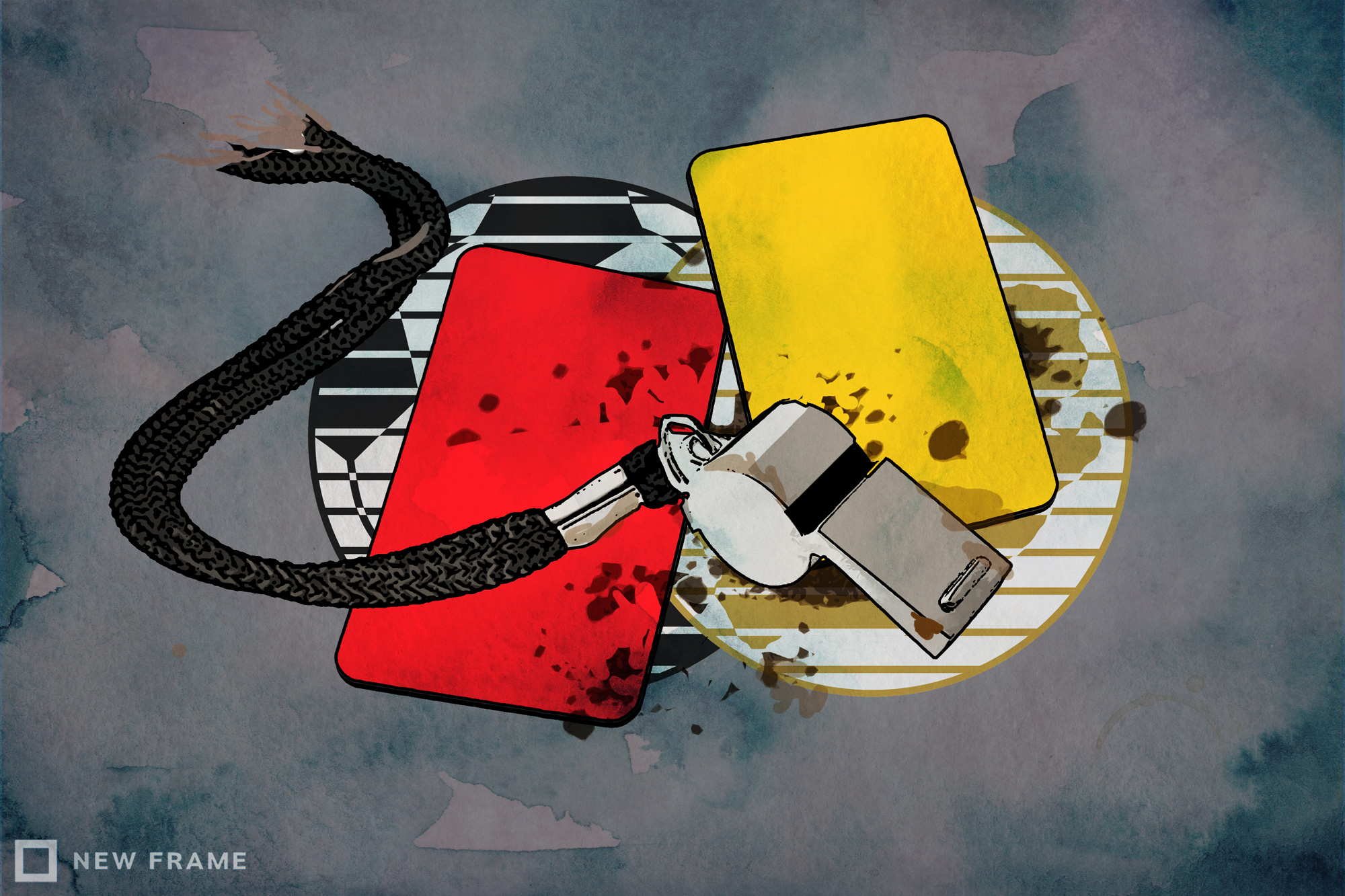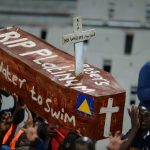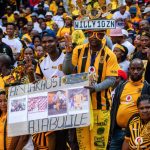The state of football refereeing in SA
The South African Football Association has chosen to bury its head in the sand when the competence of its referees is questioned amid the growing number of mistakes its officials are committing.
Author:
2 December 2019

To understand why, in a professional era in which the Premier Soccer League (PSL) has just declared revenue of R1 billion for the 2018-2019 financial year, the standard of refereeing continues to lag, one has to fathom the confusing mechanics of South African football.
In a nutshell, the standard of refereeing, like the player talent production line, remains below standard because the training of match officials, like development, falls under the mother body – the bloated, cash-strapped, still professionally lagging South African Football Association (Safa).
Safa are the bosses and take it upon themselves to remind the PSL of this at regular intervals, most recently when the league and its sponsors objected to insurance company Outsurance sponsoring referees arranged by Safa, a matter that has gone into arbitration.
Safa restructured South African football when it came into being at the end of the country’s sporting isolation. There are 52 regions whose representatives attend their politburo-like annual general meetings all seemingly believing they have a say in the running of football. Perhaps it is no wonder then that the management style of controversial Safa president Danny Jordaan is perceived as non-inclusive.
PSL chair Irvin Khoza is no less autocratic by reputation. There are serious questions over Lamontville Golden Arrows owner and close ally Mato Madlala operating as acting chief executive of the PSL for four years, longer than all but one of the permanent incumbents – Trevor Phillips, who lasted for five years – since the PSL’s inception in 1996.
But the PSL is the body that has, with huge sponsorship and broadcast deals, become the far more professional in its day-to-day administration and organisation levels, and hiring of appropriate personnel.
Since the 1980s, Khoza and Jordaan have been in notorious rivalry and bitter blood has accrued. The PSL and Safa conduct themselves in the manner of opposing political parties rather than the entities, one subjugated to the other, entrusted with administering the same sport.
The refereeing situation is caught bang in the middle of this footballing cold war. Match officials are trained and overseen by Safa, but blow PSL matches.
Is there a refereeing crisis?
Amateur Safa has seemingly struggled to stay level, when it comes to referee training, with the increasing professionalism of the now billion-rand PSL. Yet when asked about this, the Safa official in charge of this matter, technical committee chair Anastasia “Natasha” Tsichlas, suggests that the standard of training is not so much the problem as continuously complaining PSL coaches and the media, which thrives on such controversy.
“It’s a long discussion, but we’re doing a great job and Safa and the president [Jordaan], and all the NEC members, already know exactly what is happening behind the refereeing issue,” Tsichlas said in a somewhat surprising appraisal in November.
Related article:
Her assessment came at a national executive committee (NEC) meeting at which Jordaan’s presentation to the media – in response to a soccer indaba that Minister of Sports, Art and Culture Nathi Mthethwa arranged without consulting the association – was that South Africa has one of the best-performing football associations on the continent.
There are some arguments for why this is not as outlandish a statement as the South African public might perceive it to be. There has been success for junior teams reaching youth World Cups and the Olympics. The women’s team have been mostly a success story.
Jordaan said Safa’s flagship senior men’s team has not underperformed, but his reasoning is flawed. He said only five teams since 1990 have won more than one Africa Cup of Nations and three, including Bafana Bafana in 1996, have won the tournament once during that period. He neglected to acknowledge the decade of underachievement from 2006 to 2015, when Bafana either did not qualify for Nations Cups or were embarrassed at the tournament when they did.
Tsichlas’ response on refereeing exhibited the same head-in-the-sand tendency that can only poison conditions for improvement at Safa. On the most recent spate of refereeing controversies, she cherry-picked the decisions the officials got right, such as Kaizer Chiefs striker Samir Nurković’s goal against Mamelodi Sundowns, which Safa’s review committee ruled was correct.
“I didn’t see one column in the media to say congratulations to the referees,” Tsichlas said, incorrectly ignoring the plentiful coverage that accompanied the review committee’s decision. “But then you see PSL coaches go and throw their toys. And everybody believes before they check properly. When we do a workshop, it’s with Fifa instructors. And they are the ones who give the go-ahead to continue as a referee.”
The best on the continent
There is some truth to what Tsichlas is saying. It is not always acknowledged that South Africa’s standard of refereeing is up with the best in Africa. The public and media mostly have little idea that it takes a minimum of four years of studying for referees to reach Safa’s Level 6 qualification, the minimum requirement for officiating in the Premier Division and GladAfrica Championship.
That is not including the years spent gaining experience in between these years of study to qualify for Levels 1 and 2, a further year for 3 and 4, and a further year each for 5 and 6, and then another for Level 7 to qualify to referee at an international level on the Fifa panel. In that time, referees, like most players, progress from officiating Local Football Association games (Safa has 311 LFAs within the 52 regions) to provincial to professional matches, where a panel of 80 referees officiate in the Premier Division, first division and reserve league.
Related article:
“At each level you have different requirements,” says ex-PSL referee Jerome Damon, one of two refereeing development officers for Fifa in Africa and head of Safa’s referees technical committee for training and development.
“In 1 to 3, you’ll get through on a theoretical exam. Levels 4 to 7 are more practical assessment. If you don’t pass your fitness assessment regularly, you don’t get certified at a level. Level 6, you’ll look at your understanding of the Laws of the Game and how you referee. Level 7, the specific focus is on how you manage the game, how you are able to interpret the Laws of the Game and how you allow a game to flow.
“As opposed to enforcing the law, it’s how well you are able to manage the laws. There’s a difference. Because if you enforce to the letter of the law, you’re going to have very boring football. People often say, ‘But the Laws of the Game are the Laws of the Game.’ It’s the particular game, the game situation, the feeling of the game and the intensity of the game. Does the game require this yellow or red card?
“Look, there are instances where it’s clear, it’s red every day of the week. But there are other instances where if you give red, everybody’s happy, or give yellow, everybody’s happy. Level 5, 6 and 7 are three-hour exam papers for 40% of your marks. And 60% of your Level 7 is your practical examination, comprising five assessments with different match assessors scoring at a constant rate of over 70%. People assume that you walk off the street and become a referee. That’s not how it works.”
Is the criticism fair?
Damon says South Africans, and the media, can be harsh on the country’s referees, making unfair comparisons to the English Premier League (EPL).
“People in SA largely watch the EPL games involving the top five, Manchester City, Liverpool, Manchester United, Tottenham Hotspur and Chelsea. All the top referees are assigned to those matches. The same happens in SA. The top referees will do the top games. But in SA people watch all the PSL games. So you get to see a referee who is not really at the top of his game yet, he’s still getting there, getting experience.”
Damon says there has been progress in training South African referees. He agrees with Tsichlas that Fifa instructors are raising the level from yesteryear, when administrators would conduct tests, which still happens on the continent, including with the Confederation of African Football (Caf).
“One thing I do know is that when I [had] just retired, I thought professional referees are the way to go. I no longer think that. I just think we can get a bit better,” he says. “Because there is just too much red tape. There are too many challenges. Remuneration. What do you do when a referee is injured, or when they’re retiring in terms of labour law? In Africa it’s really not feasible, because of the volatility in terms of football.”
Safa’s review committee is perceived as ineffective. Yet reports are sent in and video tapes reviewed every Monday and Tuesday. The committee sits, it deliberates and consults, as far sometimes as with Ifab, the International Football Association Board, which determines the Laws of the Game.
Former AmaZulu and Platinum Stars coach Cavin Johnson says there is not enough transparency from the committee, which would alleviate much confusion.
Related article:
“When they interview coaches [on television] after the game, coaches give their impression on the officials because officials ultimately control the game,” Johnson says. “But if you’re going to do that, then those reviews on a Monday have to be made public, to say this was a good or bad decision.
“Now, you have everybody talking about VAR . I don’t think VAR has a place in SA yet, because we don’t even have proper change rooms in some stadiums.”
Meeting the referees halfway
Johnson disagrees with Tsichlas’ view that Fifa instructors conducting the training is enough. And Damon’s opinion is that professional, or perhaps at least semi-professional, referees would not be a solution.
“There should be more done. I mean, one of the refs showed me what he earns. You are going to referee a derby between [Orlando] Pirates and [Kaizer] Chiefs one of these days and you earn R3 000. I was a bit shocked,” Damon said.
“And can Safa really take the refs to another level? Refs are part-time, and teachers in the week and referees on a weekend. And sometimes they have to travel to Thohoyandou on a Sunday, are back at work on a Monday, they haven’t rested, and then travel to Bloemfontein for a game on a Wednesday night.
“And we have to get that to a level for them to be emotionally involved in the game as well, with the emotional feeling of being a real athlete, which they are, too. This is where the whole football in the country is not being dealt with properly. Professionalism, medical aid, injuries and so on, those things should all be taken care of. This is where this comes back to the issue of the PSL and Safa.”
Related article:
Indeed it does. In South Africa, a relic of apartheid – when there was no united football association and club bosses and the league ruled the roost – is that the FA Cup (in South Africa the Nedbank Cup) does not fall under the ambit of the football association, as it does in almost every major footballing nation. This denies Safa a guaranteed income of hundreds of millions of rands annually. But even if Safa did administer the Nedbank Cup, could such a bloated organisation maximise the spin-offs, and plough them back into aspects such as development and referee training?
Tsichlas, who is responsible for issues such as refereeing and appointing Bafana coaches, is a former club owner of Sundowns, from an era when the league was run in a far more haphazard fashion. A relic, she has been rewarded for her contribution with an important technical post, which she does not necessarily have the expertise to fulfil.
While such issues remain, expect progress in the standard of refereeing, like most things in South African football, to proceed slowly.




